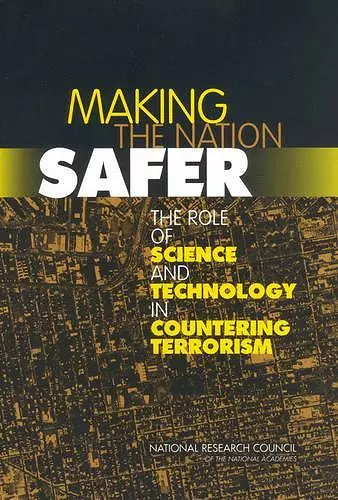Making the Nation Safer
The Role of Science and Technology in Countering Terrorism
National Research Council author Division on Engineering and Physical Sciences author Committee on Science and Technology for Countering Terrorism author
Format:Paperback
Publisher:National Academies Press
Published:5th Oct '02
Currently unavailable, and unfortunately no date known when it will be back

Vulnerabilities abound in U.S. society. The openness and efficiency of our key infrastructures — transportation, information and telecommunications systems, health systems, the electric power grid, emergency response units, food and water supplies, and others — make them susceptible to terrorist attacks. Making the Nation Safer discusses technical approaches to mitigating these vulnerabilities.
A broad range of topics are covered in this book, including:
- Nuclear and radiological threats, such as improvised nuclear devices and "dirty bombs;"
- Bioterrorism, medical research, agricultural systems and public health;
- Toxic chemicals and explosive materials;
- Information technology, such as communications systems, data management, cyber attacks, and identification and authentication systems;
- Energy systems, such as the electrical power grid and oil and natural gas systems;
- Transportation systems;
- Cities and fixed infrastructures, such as buildings, emergency operations centers, and tunnels;
- The response of people to terrorism, such as how quality of life and morale of the population can be a target of terrorists and how people respond to terrorist attacks; and
- Linked infrastructures, i.e. the vulnerabilities that result from the interdependencies of key systems.
In each of these areas, there are recommendations on how to immediately apply existing knowledge and technology to make the nation safer and on starting research and development programs that could produce innovations that will strengthen key systems and protect us against future threats. The book also discusses issues affecting the government's ability to carry out the necessary science and engineering programs and the important role of industry, universities, and states, counties, and cities in homeland security efforts.
A long term commitment to homeland security is necessary to make the nation safer, and this book lays out a roadmap of how science and engineering can assist in countering terrorism.
Table of Contents- Front Matter
- Executive Summary
- 1. Introduction
- 2. Nuclear and Radiological Threats
- 3. Human and Agricultural Health Systems
- 4. Toxic Chemicals and Explosive Materials
- 5. Information Technology
- 6. Energy Systems
- 7. Transportation Systems
- 8. Cities and Fixed Infrastructure
- 9. The Response of People to Terrorism
- 10. Complex and Interdependent Systems
- 11. The Significance of Crosscutting Challenges and Technologies
- 12. Equipping the Federal Government to Counter Terrorism
- 13. Essential Partners in a National Strategy: States and Cities, Industry and Universities
- Bibliography
- Appendix A: Committee and Staff Biographies
- Appendix B: Panel Members and Staff
- Appendix C: Panel Activities
- Appendix D: Acronyms and Abbreviations
- Index
ISBN: 9780309084819
Dimensions: unknown
Weight: unknown
440 pages